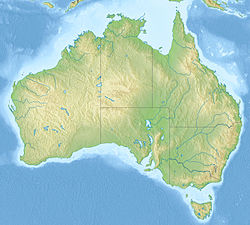Toolebuc Formation
| Toolebuc Formation | |
|---|---|
| Stratigraphic range: Albian ~ | |
| Type | Geological formation |
| Unit of | Rolling Downs Group |
| Underlies | Allaru Formation |
| Overlies | Wallumbilla Formation |
| Thickness | Up to 65 m (213 ft) |
| Lithology | |
| Primary | Limestone, mudstone |
| Other | Shale |
| Location | |
| Coordinates | 20°24′S 144°24′E / 20.4°S 144.4°E |
| Approximate paleocoordinates | 52°42′S 132°30′E / 52.7°S 132.5°E |
| Region | Queensland |
| Country | |
| Extent | Eromanga Basin |
The Toolebuc Formation is a geological formation that extends from Queensland across South Australia and the Northern Territory in Australia, whose strata date back to the Albian stage of the Early Cretaceous. Dinosaurs,[1] pterosaurs, plesiosaurs, ichthyosaurs, protostegid turtles, sharks, chimaeroids and bony fish remains are among the fossils that have been recovered from the formation.
Description
Deposition occurred in a cool to temperate inland sea setting and the present lithology is dominantly made up of limey shales with abundant Inoceramus bivalve shells. Ichthyosaurs and protostegid turtles were the most common marine reptiles at this time in the Eromanga Sea, in contrast to older Aptian deposits such as the Bulldog Shale of South Australia, which show that plesiosaurs were previously more abundant and also more diverse. The Toolebuc Formation is one of the richest known sources of Mesozoic vertebrate fossils in Australia, with notable collecting areas situated around the towns of Richmond, Julia Creek, Hughenden and Boulia.
Fossil content
Possible indeterminate ankylosaurid remains are present in Queensland, Australia.[1] Indeterminate ornithopod remains have also been found in Queensland, Australia.[1]
Reptiles
| Dinosaurs (including birds) | ||||
|---|---|---|---|---|
| Genus | Species | Presence | Notes | Images |
| Kunbarrasaurus | K. ieversi | Queensland | [1] |  |
| Muttaburrasaurus | Indeterminate | Queensland | [1] |  |
| Nanantius | N. eos | Queensland | "Tibiotarsi and vertebra"[1][2] | |
| Pterosaurs | ||||
|---|---|---|---|---|
| Genus | Species | Presence | Notes | Images |
| Aussiedraco | A. molnari | Queensland | ||
| Mythunga | M. camara | Queensland | ||
| Plesiosaurs | ||||
|---|---|---|---|---|
| Genus | Species | Presence | Notes | Images |
| Kronosaurus | K. queenslandicus | Queensland |  | |
| Eromangasaurus | E. australis | Queensland | ||
| Polycotylidae indet. | Undescribed polycotylid (specimen QM F18041, nicknamed Penny) | Queensland | [citation needed] | |
| Ichthyosaurs | ||||
|---|---|---|---|---|
| Genus | Species | Presence | Notes | Images |
| Platypterygius | P. australis | Queensland |  | |
| Turtles | ||||
|---|---|---|---|---|
| Genus | Species | Presence | Notes | Images |
| Bouliachelys | B. suteri | Queensland |  | |
| Cratochelone | C. berneyi | Queensland | ||
| Notochelone | N. costata | Queensland | ||
See also
- List of dinosaur-bearing rock formations
- Paja Formation, Kronosaurus and Platypterygius Lagerstätte in Colombia
- Sierra Madre Formation, contemporaneous fossiliferous formation of Mexico
- Santana Group, contemporaneous Lagerstätte in northeastern Brazil
References
Bibliography
- Leahey, Lucy G.; Ralph E. Molnar; Kenneth Carpenter; Lawrence M. Witmer, and Steven W. Salisbury. 2015. Cranial osteology of the ankylosaurian dinosaur formerly known as Minmi sp. (Ornithischia: Thyreophora) from the Lower Cretaceous Allaru Mudstone of Richmond, Queensland, Australia. PeerJ 3. e1475. Accessed 2020-03-16. doi:10.7717/peerj.1475 PMID 26664806
- Weishampel, David B.; Peter Dodson, and Halszka Osmólska (eds.). 2004. The Dinosauria, 2nd edition, 1–880. Berkeley: University of California Press. Accessed 2019-02-21. ISBN 0-520-24209-2

